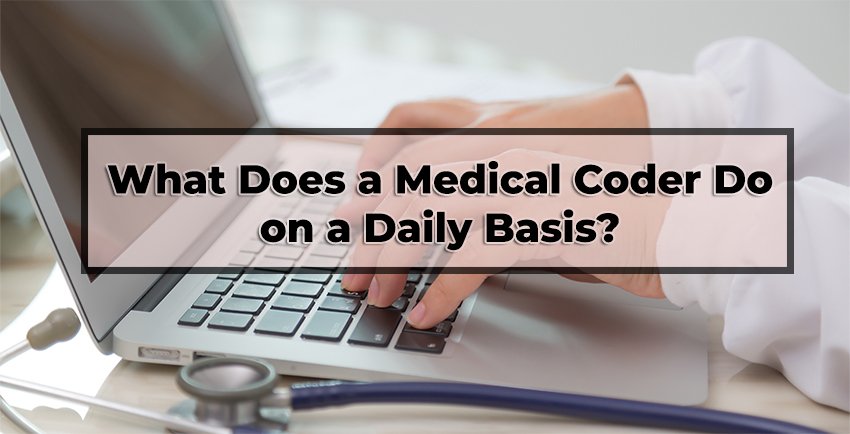What Does a Medical Coder Do on a Daily Basis?
Medical coders play a crucial role in the healthcare system by ensuring that all medical diagnoses, procedures, and treatments are accurately translated into standardized codes. These codes are essential for billing, insurance claims, and maintaining detailed healthcare records. Medical coders work in a variety of settings, including hospitals, physician offices, and insurance companies, and their daily tasks are integral to the efficiency and accuracy of healthcare operations. Let’s take a detailed look at what a medical coder does on a daily basis.

Reviewing and Analyzing Medical Records
One of the primary tasks a medical coder performs daily is reviewing patient medical records and clinical documentation. This involves reading through doctors' notes, lab reports, and other documentation related to patient care. Coders must carefully analyze the information to understand the diagnoses, treatments, and procedures that were provided.
- Why it’s Important: Accurate analysis of medical records ensures that coders assign the correct codes, which directly impacts billing and insurance claims.
Assigning Correct Medical Codes
After reviewing the medical records, coders translate the healthcare provider’s documentation into standard medical codes. These codes are based on standardized coding systems such as ICD-10 (International Classification of Diseases), CPT (Current Procedural Terminology), and HCPCS (Healthcare Common Procedure Coding System).
- ICD-10: Used to code diagnoses and medical conditions.
- CPT: Used to code medical procedures and services.
- HCPCS: Primarily used for billing Medicare and Medicaid services, including medical equipment and supplies.
Why it’s Important: Accurate coding ensures that healthcare providers are reimbursed correctly for their services, and it helps insurance companies process claims efficiently.
Ensuring Coding Compliance
Medical coders must ensure that the codes they assign comply with current regulatory guidelines and payer-specific rules. Coders must stay updated on coding changes and payer requirements to avoid issues such as claim denials or audits. They also need to ensure that they follow the rules set forth by HIPAA to protect patient confidentiality.
- Why it’s Important: Compliance ensures the accuracy of claims, minimizes errors, and prevents issues with legal and regulatory bodies.
Communicating with Healthcare Providers
When the documentation is incomplete, unclear, or ambiguous, medical coders often need to communicate with healthcare providers to clarify details. This may involve querying physicians to ensure that the medical records support the codes assigned. Coders also ensure that the documentation accurately reflects the care provided.
- Why it’s Important: Clear communication between coders and providers helps avoid coding errors, claim denials, and under- or overbilling.
Submitting and Reviewing Insurance Claims
Once codes are assigned, they are used to create insurance claims. Coders often work with billing teams to submit these claims to insurance companies, Medicare, or Medicaid for reimbursement. Coders may also review claims that have been returned or denied by insurance payers to correct errors and resubmit them.
- Why it’s Important: Timely submission of accurate insurance claims ensures that healthcare providers are reimbursed promptly and avoids delays caused by coding errors.
Staying Updated on Coding Guidelines
Medical coding is constantly evolving, with updates and changes in coding systems, regulatory guidelines, and insurance policies. Coders must keep up with these changes to ensure that they apply the correct codes and comply with industry standards. This often involves attending coding workshops, webinars, or continuing education courses.
- Why it’s Important: Keeping up-to-date with coding changes prevents errors and ensures compliance with current laws and insurance requirements.
Auditing and Reviewing Codes
Medical coders are often involved in auditing their own work or the work of others to ensure that the coding is accurate and compliant. Regular audits help identify any patterns of errors or areas that need improvement, and they ensure that the organization is following best practices.
- Why it’s Important: Regular audits help maintain accuracy, compliance, and financial stability by preventing incorrect claims that could lead to revenue loss or legal issues.
Correcting Coding Errors
When coding errors are identified, either through audits or claim rejections, medical coders are responsible for correcting these mistakes. This may involve reviewing the documentation again, assigning new codes, and resubmitting claims.
- Why it’s Important: Correcting coding errors helps resolve billing issues, avoids potential audits, and ensures the proper reimbursement for healthcare services.
Managing Medical Coding Software
Many medical coders use specialized coding software and Electronic Health Record (EHR) systems to assist in their daily tasks. Coders need to navigate these systems efficiently to retrieve patient information, input codes, and submit claims electronically. They may also use Computer-Assisted Coding (CAC) tools to speed up the coding process and reduce manual entry errors.
- Why it’s Important: Efficient use of coding software enhances productivity, reduces the risk of human error, and ensures accurate submission of claims.
Collaboration with Billing and Revenue Cycle Teams
Medical coders often work closely with billing specialists and the revenue cycle management (RCM) team to ensure the financial health of the healthcare organization. Coders collaborate with these teams to resolve claim denials, ensure proper reimbursement, and optimize the revenue cycle process.
- Why it’s Important: Close collaboration between coding and billing teams ensures that claims are processed smoothly, payments are received on time, and financial losses are minimized.
A medical coder's day is filled with tasks that require attention to detail, accuracy, and a thorough understanding of medical terminology and coding guidelines. From reviewing patient records and assigning accurate codes to submitting claims and ensuring compliance, medical coders play an essential role in the healthcare revenue cycle. Their work helps ensure that healthcare providers are paid for their services and that insurance claims are processed efficiently and correctly.

